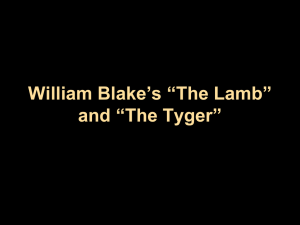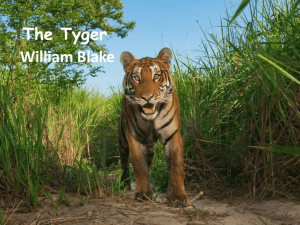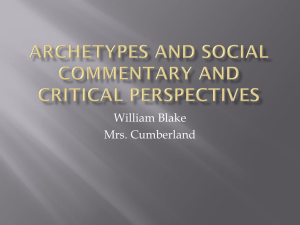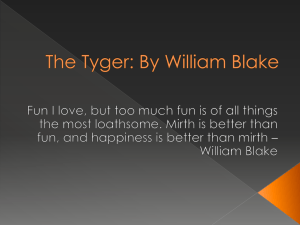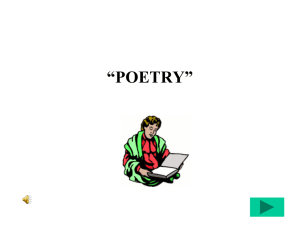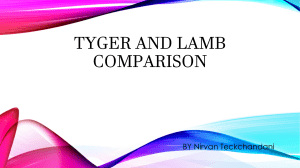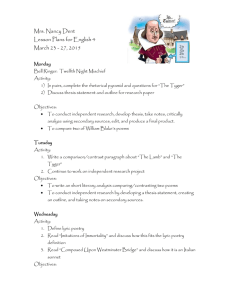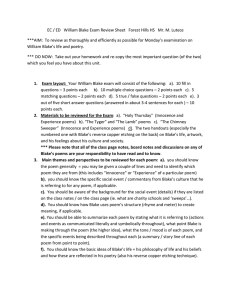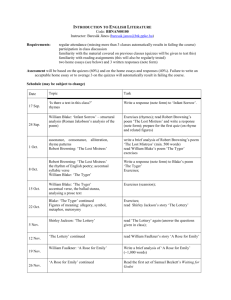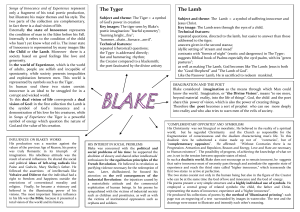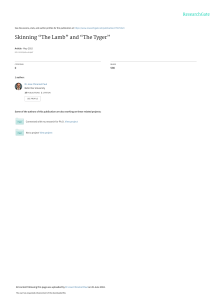Poems
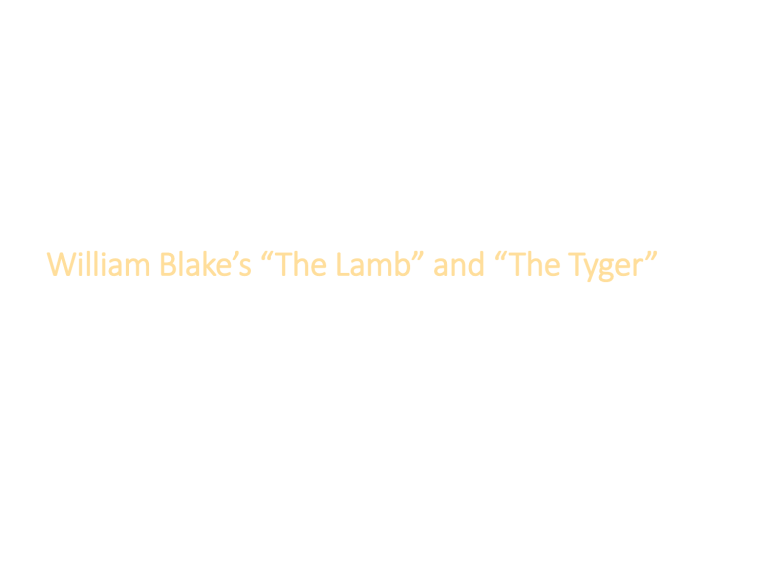
William Blake’s “The Lamb” and “The Tyger”
Theme: Faith
• reveals his confidence in his simple Christian faith and his innocent acceptance of its teachings.
Theme: Creation
• The opening question enacts what will be the single dramatic gesture of the poem, and each subsequent stanza elaborates on this conception. Blake is building on the conventional idea that nature, like a work of art, must in some way contain a reflection of its creator.
Theme: Creator
• One of the central themes in his major works is that of the Creator as a blacksmith.
• Blake identified God's creative process with the work of an artist.
And it is art that brings creation to its fulfillment -- by showing the world as it is, by sharpening perception, by giving form to ideas.
Key Image ???
From Songs of Innocence-
“The Lamb”
The Lamb
• the natural world contains much that is gentle and innocent
• Symbolically, Christ is "the lamb of God."
Key Images:
• The Tyger: symbolizes much that is terrible and frightening.
• The Smithy: represents a traditional image of artistic creation; here
Blake applies it to the divine creation of the natural world.
Refrain
• Repetition in the first and last couplet of each stanza makes these lines into a refrain, and helps to give the poem its song-like quality.
Apostrophe
• The poem's apostrophic form contributes to the effect of naiveté since the situation of a child talking to an animal is a believable one, and not simply a literary contrivance.
Symbolism
• It shows the whole connectedness of all things, it connects it all with the creator, the lamb, Jesus, through the use of the extended metaphor. He tells him how Jesus was just like a lamb, using symbolic language, comparing Jesus to a child. This creates a third connection, a child is like a lamb, Jesus is like a child. ”
Rhetorical Question
• "The Tyger", which actually finishes without an answer, is (on this level) about your own experience of not getting a completely satisfactory answer to this essential question of faith.
Allusion
• "When the stars threw down their spears / And watered heaven with their tears"
• A reference to the battle in Heaven between God and the rebel angels
Imagery
• Words work together to reinforce the concept of God as a blacksmith
• anvil, hammer, chain, furnace, frame
Repetition
• The repeated use of word the "dare" to replace the "could" of the first stanza introduces a dimension of aspiration and willfulness into the sheer might of the creative act.
• Engraving from Songs of Innocence. How does the image convey the tone, mood, setting, and action of the poem?
• Colors are pastel and light by nature: representative of nature
• A gentle, pastoral setting
• The trees gently intertwine to create a sense of protection
• Engraving from Songs of Experience. How does the image convey the tone, mood, setting, and action of the poem?
• The darker colors create a menacing atmosphere
• The oranges of the tyger are symbolic of hell
• The smile of the animal suggests slyness
• How do the poems work harmoniously to convey a similar theme or message?
• The two poems give a perspective on religion that includes the good and clear as well as the terrible and inscrutable.
• These poems complement each other to produce a fuller account than either offers independently.
• They offer a good instance of how Blake himself stands somewhere outside the perspectives of innocence and experience he projects.
• In what manner do the two poems show the two contrary states of the human soul?
• The contrast is made explicitly in a comparison between `The
Lamb' and it's counterpart `The Tyger.”
• The former is all gentle rhythms and simple, comforting question-answer dynamics, there are no such eases in `Tyger.”
• “
The Tyger” evokes a persistent, driving, even tribal feeling, and the poem is all problematic inquiry without resolution or answer.
• these two worlds are animals as antithetically paired as tigers and lambs.
